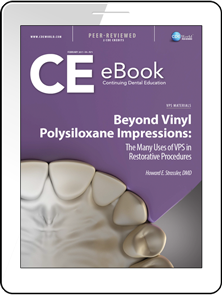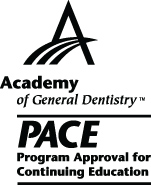CDEWorld > eBooks > Beyond Vinyl Polysiloxane Impressions: The Many Uses of VPS in Restorative Procedures


ADA CERP is a service of the American Dental Association to assist dental professionals in identifying quality providers of continuing dental education. ADA CERP does not approve or endorse individual courses or instructors, nor does it imply acceptance of credit house by boards of dentistry. Concerns or complaints about a CE provider may be directed to the provider or to ADA CERP at www.ada.org/cerp/

Approved PACE Program Provider. FAGD/MAGD credit. Approval does not imply acceptance by a state or provincial board of dentistry, or AGD endorsement. 1/1/2023 to 12/31/2028. ID # 209722.
eBook
Released: Wednesday, February 22, 2017
Expires: Saturday, February 29, 2020
Beyond Vinyl Polysiloxane Impressions: The Many Uses of VPS in Restorative Procedures
By Howard E. Strassler, DMD
Commercial Supporter: Parkell
Because of many favorable physical properties and characteristics, vinyl polysiloxane (VPS) impression materials are today’s standard for routine fixed prosthodontic treatment and for definitive impressions for orthodontic diagnosis and aligner design. VPS materials also provide a wide variety of choices in viscosities that allow for an array of clinical techniques, enabling these materials to be used in applications that go beyond impression-making. This article examines several of these expanded uses of VPS that enhance the way clinicians practice dentistry.
LEARNING OBJECTIVES:
-
Discuss the history of vinyl polysiloxane (VPS) materials and their role in impression-making.
-
Describe other restorative uses for VPS materials, including bite registration, provisional restoration templates, and splint blockouts.
-
Explain how VPS materials can be used in certain situations as a problem-solving option.
About the Author
Howard E. Strassler, DMD
Professor and Director of Operative Dentistry, University of Maryland School of Dental Medicine, Baltimore, Maryland


